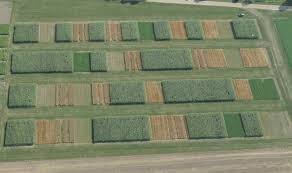Long-term Rotation and Tillage Trial
The Long-term Rotation and Tillage Trial was established in 1980 by Dr. Tony Vyn. It is located at the Ontario Crops Research Centre in Elora, Ontario, Canada which is owned by the Agricultural Research Institute of Ontario and managed by the University of Guelph through the Ontario Agri-Food Innovation Alliance. The Trial compares crop rotations that are reflective of common crop rotations in Ontario from continuous corn to complex rotations with small cereals and legume cover crops, to Ontario’s most common crop rotation: corn-soybean in order to study improvements in commodities produced there. Both this trial and a sister site in Ridgetown, Ontario serve as research platforms to understand the long-term impact of crop rotation, tillage systems, nitrogen applications, and cover crop decisions on agronomic, soil health, and environmental indicators. The overall goal is to improve crop resilience and benefit the agri-food sector by lowering costs, increasing profits and improving soil health.
Producer relevance
The experiment represents cash-grain and grain-forage production systems. Most producers in the area would employ a corn-soybean crop rotation (without forages or winter crops). The most complex crop rotations (e.g. alfalfa-corn, corn-soybean-winter wheat) represent aspirational rotation management that could provide soil health and production resilience benefits to most farms in the area.
Expected benefits
Experimental treatments were selected to showcase effects on crop production and soil health and reduce production costs.
Local stressors
The expected climate change-related stressors in the area are: atmospheric conditions (e.g., short-lived climate pollutants, dust), droughts, heat, increased incidence of pests, seasonal temperature changes, and shifting rainfall patterns.
Useful links

A birds-eye view of the Elora experimental plot.

A long aerial view of the Elora plots.

Winter field prep.

Maize and wheat plots.

Aerial view of the Elora experimental plots.

A verdant expanse of alfalfa. Behind we see wheat, maize, and either soybean or more alfalfa.